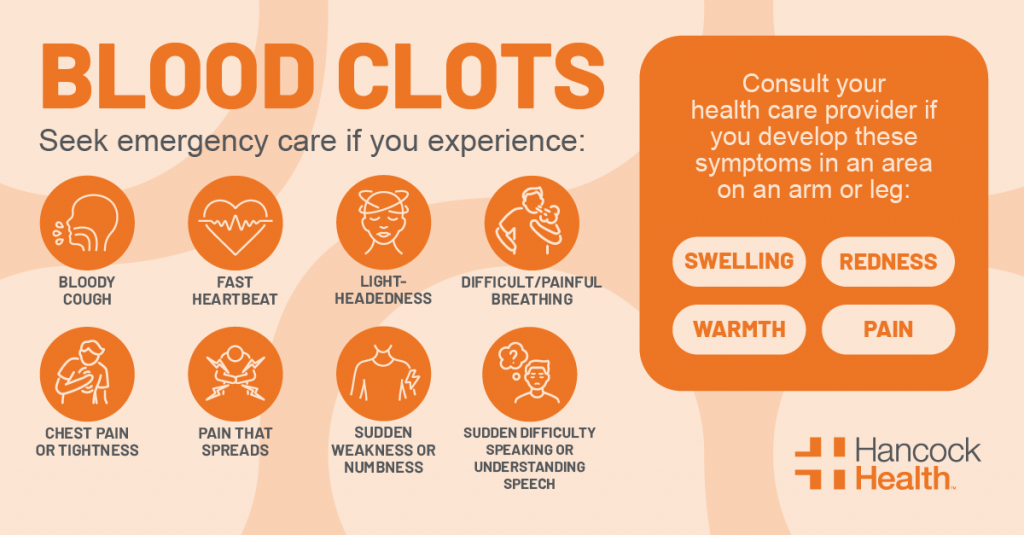For Blood Clot Awareness month, Hancock Health is sharing real stories from local Hancock County individuals who have experienced life-threatening clots in an effort to increase awareness, help others know their risk factors and prevent hardships due to blood clots.

In 2017, Steve Long, president and CEO of Hancock Health, and construction engineer Jamie Bell of NineStar Connect – long-time friends, racing competitors, and Hancock County leaders – were both diagnosed with a blood clot after separate mission trips that included a lot of traveling via planes, trains, and cars. Both required immediate medical attention for their clot, but only found out about the other’s story one day on the sidelines of the go-kart racetrack when they were subsequently not racing that year. Steve and Jamie are now on the other side of their clot stories and want to spread awareness and help others to know the signs and act fast.
Watch their story here.
Understanding Blood Clots
The CDC reports that nearly 900,000 people are affected by blood clots each year in the U.S. and a 100,000 die from complications. Moreover, three in 10 people who have had blood clots will most likely have another episode within 10 years.
Mayo Clinic notes that blood clots are gel-like clumps of blood. They are made when substances in the blood thicken and form a semisolid mass. They form in response to a cut or other injury; they stop the bleeding by plugging the injured blood vessel. These blood clots help the body heal.
But some blood clots form inside the veins without a good reason. They don’t dissolve naturally. Once these clots form, they can travel to other parts of the body where they can cause harm. There are a variety of factors and conditions that can cause troublesome blood clots, and they may require medical attention, especially if they are in the legs, lungs, or brain.
Blood clot symptoms include:
- Swelling
- Redness
- Warmth
- Pain
- Change in skin color, such as an area of the leg that looks unusually red or purple
- Cough that produces bloody sputum
- A fast heartbeat
- Lightheadedness
- Difficult or painful breathing
- Chest pain or tightness
- Sudden weakness or numbness of the face, arm, or leg
- Sudden difficulty speaking or understanding speech

Aside from family history, other risk factors that can increase your chance of developing a blood clot include, but are not limited to:
- Obesity
- High blood pressure
- High cholesterol
- Pregnancy
- Immobility
- Smoking
- Diabetes
- Oral contraceptives
- Certain cancers
- Age (increased risk for people over age 60)
To reduce the risk of developing blood clots, try these self-care tips:
- Avoid sitting for long period: Especially if you travel by airplane, or for long car or bus trips – walk the aisle occasionally and/or stop frequently to walk around
- Move: Especially after you have had surgery or have been on bed rest, the sooner you move the better
- Hydrate: Dehydration can increase the risk of blood clots
- Lifestyle changes: Stop smoking, exercise regularly, maintain a healthy weight, lower high blood pressure
Some of the serious conditions that can be associated with blood clots are:
- Antiphospholipid syndrome
- Arteriosclerosis / atherosclerosis
- Cancer
- Certain medications, such as oral contraceptives and hormone therapy drugs
- Coronavirus disease (COVID-19)
- Deep vein thrombosis (DVT)
- Factor V Leiden
- Family history of blood clots
- Heart arrhythmia (heart rhythm problems)
- Heart attack
- Heart failure
- Obesity
- Peripheral artery disease (PAD)
- Polycythemia vera
- Pregnancy
- Prolonged sitting or bed rest
- Pulmonary embolism — a blood clot in an artery in the lung
- Smoking
- Stroke
- Surgery
To see more real blood clot stories, visit the CDC’s Real Stories website page, and make a point to discuss your risk factors with your provider. Need a provider? Find a doctor here.
Relevant Services
Pulmonary & Respiratory Services
We offer a wide range of services for disorders of the heart and lungs.
Family & Primary Care
Explore health care for all members of your family, from pediatrics to senior care.
Diabetes Care
Explore treatment and program options to live well with diabetes.
Cardiovascular Services
We use state-of-the-art technology to diagnose and treat cardiovascular problems.
Cancer Care
Learn about our nationally accredited cancer care with advanced screenings and treatments.